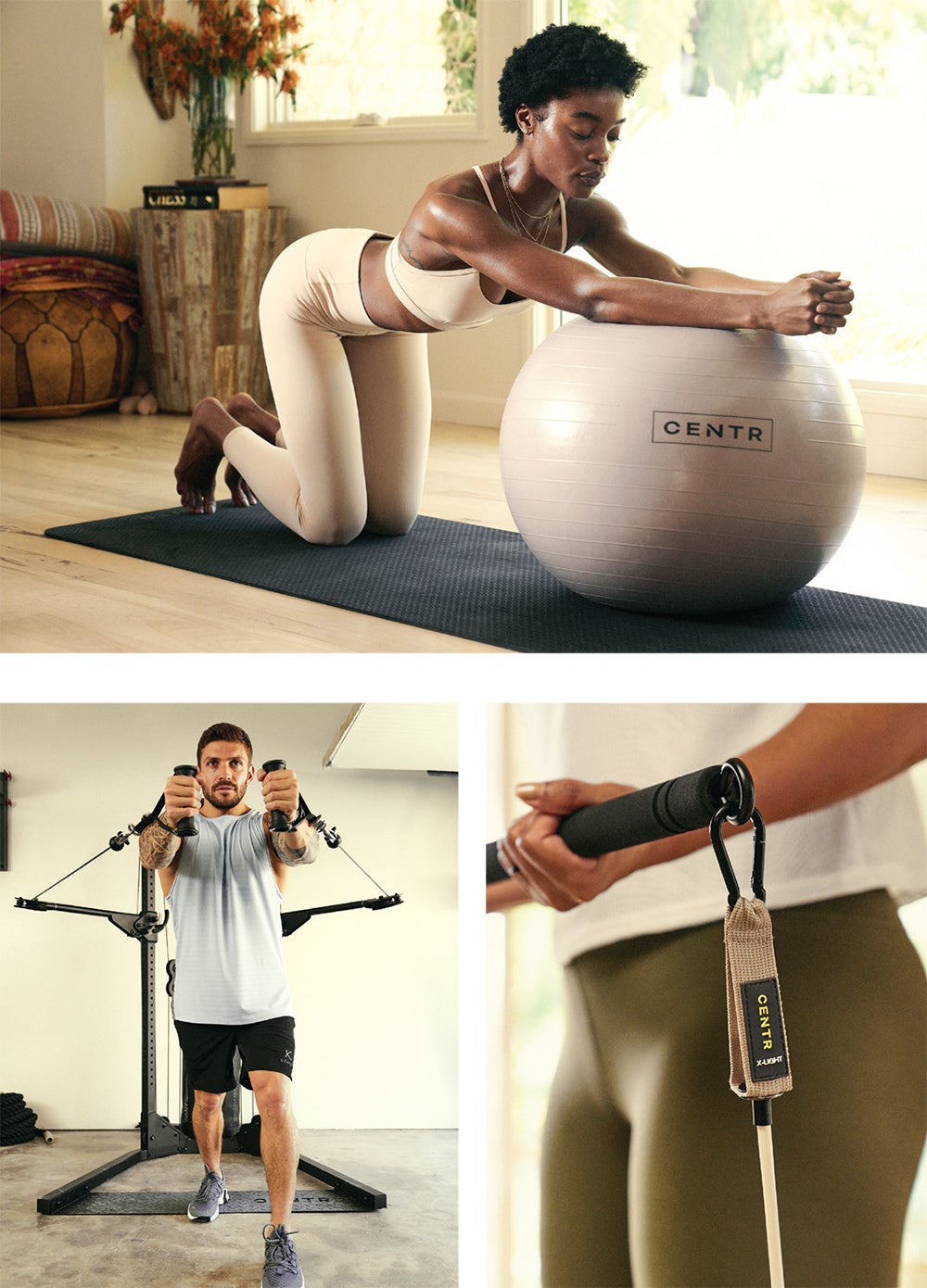Great movies always have a scene that screenwriters call “The Dark Night of the Soul.” It’s that spot where the hero questions not just what they’re doing, but why they’re doing it. Why they’re doing anything. It resonates because we’ve all had our own dark nights.
Chris Hemsworth had one about 15 years ago. He’d moved from his native Australia, where he’d been wildly successful as a young soap opera star, to Los Angeles, hoping to star in much more than soaps.

Image Credit: Anthony Blasko
It wasn’t working out the way he’d hoped. He was missing out on roles. Bombing auditions. Waiting for callbacks that never came. “Eight months, nine months with sort of nothing — and the feedback was getting worse,” he says. One night, as Christmas approached, he looked around the home where he was staying — his manager’s guest house, which almost accentuated his precarious position, because the manager knew how much Hemsworth was struggling and allowed him to stay rent-free. He thought, Should I be here?
Related: Why Making Others Feel Important Will Make You Happier and More Successful
Should he just fly home for the holidays and not come back? Give up on his grand ambition for L.A. — starring in major motion pictures — which was also his grand ambition for life?
Everything on this dark night suggested he should.
Then he asked another question.
Why did I start this?
Meaning: Why did he move to L.A.?
That’s right, he thought. To take care of my parents.
He’d split his time as a kid between Melbourne and an aboriginal community in the northern Outback called Bulman. It wasn’t only for the rustic adventures — the cattle drives and proximity to crocodiles — that the Hemsworth family kept returning there. They were hard up for cash. His mom, Leonie, was a high-school teacher and his dad, Craig, a counselor working in the Australian equivalent of child protective services — and the Outback was a low-cost outlet for his parents’ passion-driven careers. Chris was the middle of three brothers who spent his boyhood in a loving family, sure, but never a prosperous one.
So when Chris moved to L.A., he vowed to make enough money to pay off his parents’ mortgage. Then he promptly got caught up in, as he says, “all of what I’d wanted to do.” He’d wanted to land those big roles. Become some A-lister. That hadn’t happened, which led to endless self-criticism, which threw off the next audition, and the next. The cycle devolved further, spun blacker.
No more, he thought.
He came out of his dark night carrying a new vow. He wanted to be of service, he told himself — to think about other people, and what they might want from him, instead of the other way around. This meant setting up his parents, yes, but it also meant working in a new way.
Related: 5 Ways to Keep Yourself Inspired to Achieve Your Goals
When you think about fulfilling other people’s needs, you start to act and talk differently. You catch the nuances you might have missed — instead of focusing on the money you want, you see how an investor thinks and how you can relate. Instead of focusing on the sale you want to land, you focus on the way a customer speaks and the way they frame their problems. For Hemsworth, instead of focusing on the roles he so desperately wanted, he started going into every audition asking himself, How can I make the casting director’s job a no-brainer? He wasn’t there to show off; he was there to make things easy.
“If my purpose was built around something outside myself,” Hemsworth says, “I felt a lot more comfortable in what I was doing.” By his own admission, he carries a lot of “criticism and self-judgment” — even now. No amount of Thor movies can reprogram a self-doubting brain. But the idea of service — of gearing his actions toward the fulfillment of others’ needs — is about the closest he’s come to clarity. He’s built it into his acting, and now, into a four-year-old fitness business that recently reached a reported $200 million valuation.
Because, as it turns out, success often comes from thinking about others first.

Image Credit: Anthony Blasko
Hemsworth loves a good origin story, so here’s the one about his fitness app.
In the beginning there was the Outback. His parents worked on the cattle farm in rural-most Bulman, and ran a community center that doubled as a post office and a grocery store. Money was tight, yes, but he didn’t want for much. He found satisfaction in pushing his physical limits — “going outside my comfort zone,” he says.
He played Australian Rules Football as a kid, and weightlifting became an end in itself. Nothing puts you in a state of burning discomfort like repping out on squats. His uncle dabbled in weightlifting, too, and a teenage Hemsworth worked out with him in his garage gym, posters of a jacked Arnold Schwarzenegger all around.
“And I’d be like, “Ah, cool!” Hemsworth says.
From there, he got into nutrition. He learned of protein’s central role in muscle growth and downed protein shakes with his uncle. His parents were health-conscious; his father was once a footballer as well, and on nights before games, Craig would tell Chris, “We need to make sure you have some carbohydrates.” Before a game meant oatmeal, veggies, protein. Hemsworth saw how eating clean at home led to better play on the field — certainly better than the mates who “gorged on Coke and a meat pie” prior to kickoff, he says.
Related: 4 Strategies Entrepreneurs Use to Overcome Obstacles
The point is, long before Chris Hemsworth looked like some Norse god, he trained like one. Then his career advanced, and as he prepared for those Avengers movies, he started learning from world-class trainers and nutritionists. (We spoke in July during the SAG-AFTRA strike and, in solidarity with his peers, he would not talk about his movies.)
People started asking Hemsworth about his training regime. What was he eating? What was he doing? And he realized: Here was another opportunity to think in terms of service. How could he anticipate others’ needs? What do they want that he can provide?

Image Credit: Courtesy of Centr
The first step seemed obvious: He could share what he’s learned. How, though? Was it a physical gym? Some cookbook? Nah, the thing that made the most sense to Hemsworth was a website and app. There were a million fitness websites and apps, yes, but not one that served people the way he felt they needed — which is to say, a service that goes beyond fitness and diet. Because that alone is not enough. Not to Hemsworth, at least.
Because if you want to be strong, you must feel strong. Hemsworth doesn’t always — and he knows others don’t too.
Related: 5 Ways to Overcome Self-Doubt as an Entrepreneur
You’d think Chris Hemsworth’s life is all awesome workouts and Oscar parties and surfing from Instagram-perfect locales with his wife Elsa Pataky and their three kids. And OK, sometimes it is. But even then, Chris can’t always enjoy them. It’s the classic story of the self-made man: The boy who grows up without money gets it as an adult, only to worry how he’ll remain successful. Much of Hemsworth’s career, even after that Dark Night of the Soul, had been “anxiety, doubt, and self-criticism,” he says. Will he botch the next role? Bomb the next time at the box office? Is this successful movie his last? “I think for me the biggest challenge is reining in my thought process,” he says. “Not having too many things that I’m pulling apart and picking apart and analyzing and critiquing and so on.”
Years ago, he searched for a solution to this. That’s how he found meditation, which helped free him of these thoughts. Or rather: Meditation helped him realize his thoughts were only that. Hemsworth could choose to ignore them. All thoughts pass once you realize they’re just thoughts. Or he could choose to label these thoughts, sometimes even the fearful ones, as something else entirely. The fear, for example, could be labeled exciting. “It became my approach to anything in life that was terrifying, or threatening to limit what I could do,” he says. “I would accept that these feelings were there, and I’d actually look at them as a positive: You know, whether you are incredibly nervous or incredibly excited, you have the same physical response.” By choosing to label your fear as, say, anticipation, you incorporate the fear into a larger whole. “You accept it,” Hemsworth says.
In the same way that there was a duality to his service — what benefits others ultimately, paradoxically, benefits him — Hemsworth began to see how there’s a duality to his thoughts and everyone else’s. We think that, say, our stress is terrifying, but that’s only if we allow it to terrify us. Our stress can also be seen as the necessary emotion to help us try something new, or something hard, and make us stronger and more capable of doing still harder things.
Hemsworth and I talk about Shakespeare’s line in Hamlet, “There is nothing either good or bad but thinking makes it so.” He loves that. It’s our judgment of our thoughts that grant them their power, he says. Thoughts on their own are, again, just thoughts.
Related: Your Customers Are More Interested in Your Purpose Than Ever — Here Are 3 Steps to Showcase It
“Meditation helped take that nervous energy and that anxiety of mine and say, ‘I put it there. No one else injected it into my system. I did it. So now I’ll control it. It’s on my terms,'” he says.
So this became his big idea: To really teach others what he knew, he would need to fuse fitness and diet with meditation. “Overall well-being,” he says.
In 2018, Hemsworth, some friends, and some VC backers began plotting this concept out. They called it Centr — as in, at the center of not one thing but three complementary things, each as important as the rest.

Image Credit: Courtesy of Centr
What are you qualified to teach others?
This feels like a trick question. Yes, sure, you know things that others would like to know. But what makes you qualified to teach it? Are you the singular expert? Probably not — there’s always someone out there more experienced, more knowledgeable, and more accomplished than you. So, what is it? Why should people trust and pay you?
This stumbling block has tripped up many a founder and creator, and even just people struggling to post on LinkedIn. Hemsworth, with his ever-present self-doubt, could have tripped up on it too.
But he realized a couple things.
The first is an idea popularized by Jeff Walker, bestselling author of the book Launch, who helps people create digital products and services. Walker’s central tenet is that you don’t have to have a Ph.D. to teach what you know. You just must know more than your audience, the beginners in your field. It is a liberating idea. No matter where you are on the ladder of knowledge, you have value to offer those below you.
Related: The Four Steps to Creating Lasting Change in Any Area of Your Life
The second is that Hemsworth knows a lot of people — trainers, nutritionists, mindset gurus. They agreed to help his cause, and in turn, his company would highlight these experts. They would be the costars. Hemsworth wouldn’t just be saying, This is what I know. He’d also be saying — and this was key — This is who’s taught me.
This approach is what Tony Robbins calls “reporting.” You present other people’s insights within your business. You can partner with these experts outright or credit their work and direct your customers to their books and services, but Robbins’ point, which he relays in his and Dean Graziosi’s Knowledge Broker Blueprint, is that reporting gives you, the reporter, gravitas. Gravitas leads to your entrepreneurial success. Robbins has been doing some form of this so-called reporting his whole career.
Of course, if an entrepreneur wants to teach something, it’s also important for them to build social proof. That can be in the form of social media followers, professional associations, endorsements, and so on. On this front, Hemsworth had a few unfair advantages — like a godlike body that’s all over Hollywood and an Instagram account with more than 57 million people who already enjoy watching him work out. But as any online founder will tell you, testimonials, be they a blockbuster film or viral workout videos on “the ‘gram,” are the currency that leads to you banking it. Use every advantage you have.

Image Credit: Anthony Blasko
When Centr neared its January 2019 launch date, Hemsworth’s nerves were high — perhaps even accompanied by some of his old anxiety. What will it mean if this fails? he thought. But through meditation, he’d learned to be “less concerned with the final destination and more concerned with being in the moment,” he says.
So Centr launched. Its workout and meal plan and mental fortitude features cost up to $30 a month (or $120 a year), which the reviewer at USA Today, Sara Hendricks, called “the priciest fitness app I’ve ever tested.” She also said it was worth it. Not all reviews were positive, but thousands of users seemed to agree: No program paired fitness with meal plans the way Centr did, and then told you how you might reduce your stress through meditation or reorient your mindset through positive affirmations.
Related: 8 Effective Ways to Connect With Your Customer
The beauty of Centr quickly became its malleability. It wasn’t just that you could meditate alongside Hemsworth in the morning and then work out alongside his trainer at night. It was really that you could take Centr’s workouts and meals and affirmations and apply them to your existing routines. For instance, I did multiple Centr workouts from my home gym. I didn’t have to buy anything special to do the workouts. I loved that and told Hemsworth as much. “It’s always been about personalization,” he says, “and having a plan that was curated to the individual and their specific needs.”
By not forcing people to do as Chris Hemsworth does, Centr instead meets people where they are and asks, How can we be of service?

Image Credit: Courtesy of Centr
It’s worked. In 2022, Centr had 200,000 worldwide subscribers, and Hemsworth and his backers sold the company to HighPost Capital — the private equity firm cofounded by Mark Bezos, the younger brother of Jeff. HighPost then bought Inspire Fitness, which makes exercise equipment, and folded Inspire into Centr in a deal that valued the combined company at more than $200 million, according to reports.
Hemsworth is still involved with Centr today, with the second-largest stake in the company behind HighPost. And he’s still committed to unveiling new features. This fall, the site will update with new movements and workouts that Hemsworth either led or curated — movements and workouts that’ll themselves pair with fitness products to debut at 4,000 Walmart stores, says Andrew Sugerman, Centr’s CEO. “With this line at Walmart, we wanted to democratize fitness to a broader audience,” Sugerman says.
Hemsworth likes helping people similar to that teenage boy who’d once stared at photos of Schwarzenegger on the walls of his uncle’s home gym: the people curious about fitness, but living on a budget. “I’d say that my vision is the same [now] as it was when I started Centr: To be able to give people all across the globe access to the tools that I’ve had, that have had a profound effect on my life.” The truth is, the people Centr has already helped — their life-altering transformations all over Centr’s website — move him deeply.
“It is,” he says, “the most rewarding thing I’ve done in my career.”
It’s that paradox of selflessness again. When you think of others, more gifts than you could imagine will come your way.
Related: Why Entrepreneurship Is Better Than Any Personal Growth Book
This article is from Entrepreneur.com









